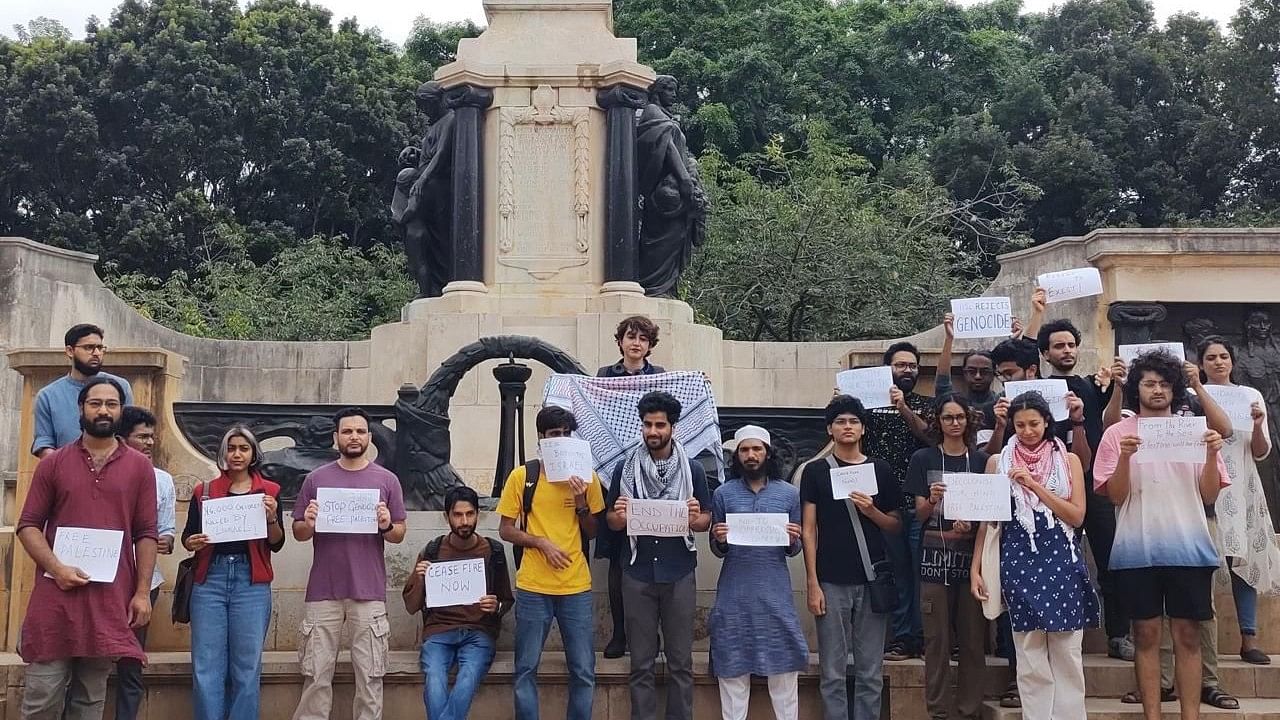
Students protest against the India-Israel Business Meet in the IISc campus on Monday.
Credit: Special Arrangement
Three Bengaluru events in the past week have faced opposition for their association with Israel.
Protestors argue this is not the time to stay “neutral”. This comes at a time when the criticism of Israel, which stands accused of genocide in Gaza and of widening tensions in the Middle East, is mounting globally.
The resistance had been primarily led by students from city colleges. However, heads of educational institutions feel a blanket condemnation of events or persons related to Israel is unfair.
What happened
On September 23, IISc Bengaluru hosted an India-Israel business summit in its J N Tata Auditorium. This, despite an open letter from academia and an on-campus protest involving students and civil society calling for its cancellation. Defence was one of the focus areas of the meet and the campaigners felt by leasing their premises for such an event, the institute was ignoring the global call for an arms embargo against Israel. According to reports, IISc students weren’t aware of the meeting until posters went up. Responding to the backlash, the registrar said they rent out the auditorium to “external organisations”.
A day later, a college in the Central Business District invited an Israeli entrepreneur as a guest of honour for a two-day conference. An Instagram post on the issue says that students weren’t aware of his participation initially. Following opposition by 10-15 students, the Israeli guest did not turn up to give the keynote address on September 25, said a member of the organising committee. Metrolife’s query to the college management went unanswered.
The latest incident involves a film festival that opens today and that has affiliation with various colleges. On October 1, four student groups put out a statement that the festival organisers have withdrawn their invitation to the consul general of Israel to south India. She was expected to participate in the event as a “guest of honour”. They also removed Israel as a focus country. The groups say it was a result of their campaign. However, a festival representative told Metrolife they had “pulled out the invite” much before, citing “growing unrest in the world”. “But we had not updated the information online,” said the representative.
‘Strong stand necessary’
Journalist and activist Shivasundar supports the student resistance. “They are doing what our institutions and government should have done — take a hard stand against Israeli apartheid.” He reminds us that students around the world had come out in big numbers against apartheid in South Africa in the ’70s and ’80s and it had contributed to the end of apartheid.
“We need to build international pressure to curb Israel’s occupation and its growing expansionist interests which have brought the world to the threshold of a regional war. It will hurt everyone in a globalised economy,” he added.
An ideological clash with one’s college is not easy, said protesting students. A member of Students for People’s Democracy told Metrolife that after students objected to the Israeli panellist, they were allegedly “asked to leave the auditorium” and their “ID cards and phones were confiscated”.
A political science and sociology student says, “The management asks us to keep our politics out of the campus to maintain decorum. Do we students have no stake in what our college stands for?”
‘Not all citizens’
Should an educational institution stay neutral on the issue? Kamala Y C,
principal of a college in Basavanagudi, says, “It is a moment of dilemma. On the one hand, Israel is a hub for scientific farming and knowledge, on the other hand, it is at the helm of chaos. My personal view may not matter right now but solidarity with the larger society does.”
K Srilatha, director of a management college, says she is open to associations with Israel on a “case-to-case basis”. “If a speaker’s experience can add value to our students, why not?” she says.
A student, who was on the organising committee of the entrepreneurial conference, says it’s important to distinguish the politics of citizens from the politics of their country. “Most times, it is not the same,” she reasons.
Shivasundar and protesting students say the debate is not about cancelling Israeli citizens but about steering clear of propaganda or activities that can fuel war crimes.
Israel consulate responds
In an email, Orli Weitzman, consul general of the Israeli Consulate in Bengaluru, said Israel was unable to participate in the film festival as it was close to Rosh Hashanah, an important Jewish holiday. Furthermore, she said that “it is disheartening to see that individuals, in an attempt to support the Palestinian people, have chosen to target Israel”.
The country, she added, “is currently defending itself after the unprovoked attacks on October 7 by terrorist organisation Hamas” and its civilians were recently attacked by missiles from Iran. For those who wish for peace in the region, the focus must be on eliminating groups like Hamas and other Iranian proxies, she added.